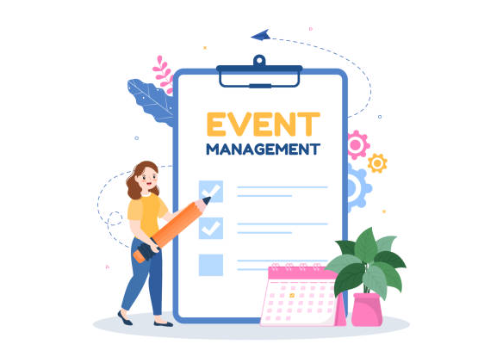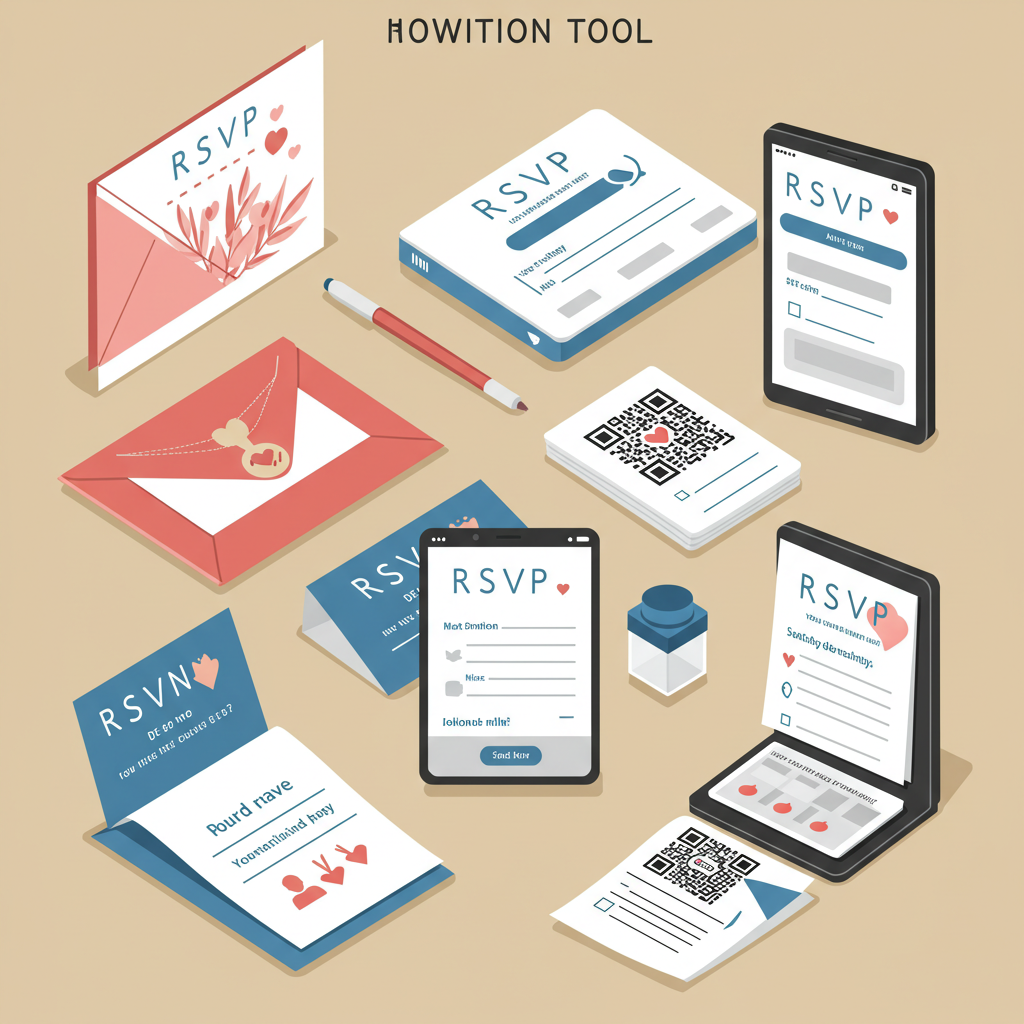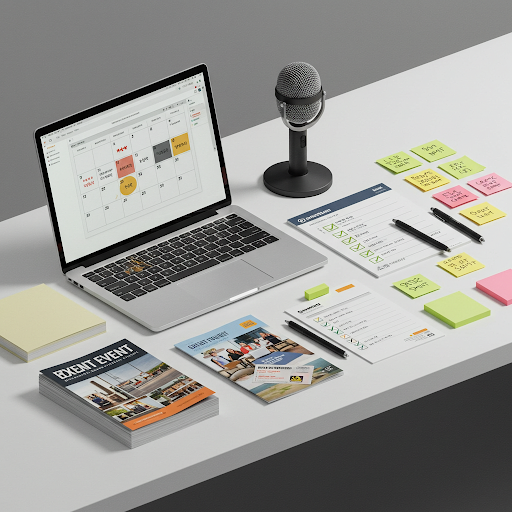Hectic schedules, last-minute calls, and unexpected errors—if you are an event manager, does this sound familiar to you
Managing an event isn’t easy. Success requires effort and a bit of luck —Whether you're planning a business conference or a wedding, focus on three key areas: planning, management, and execution.
Here’s why it matters: The global events industry, valued at $1.1 trillion in 2019, is projected to reach $2.1 trillion by 2032, according to Allied Market Research. With such rapid growth, finding ways to improve business operations is more important than ever.
The right event management tools—whether for project management or automation—can simplify the process, enhance audience engagement, and ensure smooth meeting organization.
In this guide, we’ll uncover the best tools for event management to keep the process smooth and efficient.

How to Choose the Best Tools for Event Management?
Choosing an event management tool can be overwhelming, as there may be a tool that is exactly suited for your needs. You have to ensure the event planning moves smoothly without becoming troublesome. So, to improve the attendee experience, you should choose a tool with special features.
Here are the factors to consider:
- User-friendly interface
- No distraction (ads-free)
- Provide customer support 24/7
- Customer reviews or feedback
What Tools Do Event Managers Use?
Transform the challenging process into a simple one through event management tools. Event managers consider the following software:
Customer Management Tool
There’s nothing more important for a business than managing relationships with customers. You have to use a customer relationship management (CRM) tool for this. It helps you collect and organize the attendee's information and manage their journey, showing the ROI of the hosted event.
Some top CRM tools include:
Salesforce
Salesforce provides a CRM platform to streamline business operations, from registering attendees to following up. It’s a powerful tool for engagement and tracking attendee performance. Thus, this CRM tool simplifies planning and makes the process efficient.
Hubspot
Hubspot has a ton of integrations to kick-start event planning, marketing, and sales. You can automate the processes, engage with your audience, and track the performance.
Hubspot offers:
- Event promotion
- Manage attendees
- Track analytics
- Email marketing
Manage Attendee Registration
Registering attendees manually is quite difficult; you need software to manage the process. It’s necessary to have an easy user interface for registration. So, you should use these tools to collect data and track transactions without stress.
Eventbrite
An all-in-one tool helps you observe the attendee's performance and track the conversions in real-time. Event managers can stay up-to-date on the current trends and analyze the attendance.
Bevy
With Bevy, you’ll get a detailed record of the events, either in-person or online. This platform lets managers plan, market, and automate the event. Also, it provides access to visual analytics, charts, and reports.
Email Management
According to an Eventbrite survey, 73% of event professionals consider email marketing the best strategy for interacting with attendees. However, 52% find it challenging to manage customers through mail. That’s why you’ll need tools to keep engaging using emails:
Marketo
Want to reach unlimited people with a single click? Marketo is a prominent tool in email marketing, allowing businesses to track audience behavior and run campaigns. Apart from individuals, if you’re targeting prospects, Marketo lets you follow up, nurture the relationship, and close the deal.
Iterable
Managing custom events isn’t longer challenging because Iterable allows businesses to control the system. So, run the marketing campaigns and reach out to your product users. Iterable won’t let your customer go; instead, it refines the offer and manages the event.
Event Project Planning
Whether your attendees are in a convention center or watching the webinar, make the process smooth and let them enjoy it. We recommend you use this event planner to stay on top.
Evant
Is project creation becoming a challenge for your business? If yes, Evant is the best choice. Whatever event you manage, create a project and link it with your work schedule. You can then share these workflows and deadlines with your organization's members to monitor the progress of the planning.
Here is what Evant, the work management platform, will help you with:
- Create sessions and check-in
- Make to-do lists
- CRM integrations
- Onboarding prospects
- Track milestones
Essential Equipment for Event Planners
While event management software helps streamline operations, event planners rely on essential physical equipment to ensure a smooth experience.
Here are some key items:
1. Audio-Visual (AV) Equipment
- Microphones (wireless and lapel)
- Speakers and amplifiers
- Projectors and LED screens
- Live streaming setups for virtual events
2. Lighting & Staging
- Stage platforms and backdrops
- Spotlights and LED lighting
- Trussing systems for rigging lights and banners
3. Registration & Check-in Tools
- Laptops or tablets for attendee check-ins
- QR code scanners for digital ticketing
- Badge printers for name tags
4. Event Décor & Branding Materials
- Banners, signage, and branded displays
- Podiums and speaker stands
- Seating arrangements (chairs, tables, linens)
5. Power & Connectivity
- Portable generators and power banks
- Wi-Fi routers and mobile hotspots
- Extension cords and surge protectors
To effectively leverage these tools, it's helpful to keep the 5 P's of event planning in mind...
What are the 5 P's of Event Planning?
Before planning an event, get a strong grip on these event marketing techniques to scale your business growth.
Product
Creating the event outline is essential in event planning. Your offer impacts your audience, so include the special features.
You should define these objectives clearly:
- How will the event help the attendees?
- How is your event unique from others?
- Will it provide networking opportunities?
Before setting the product, understand your target audience's pain points and provide solutions accordingly. Defining the unique selling proposition or providing valuable takeaways is the best strategy. For a successful event, refine your marketing strategy and create an irresistible product.
Price
Understanding the event’s value and the audience budget is necessary for setting a pricing strategy. You can also categorize the pricing, such as early-bird, student, and group packages. In addition, you need to be specific on what the attendee gets access to on different pricing plans.
Place
Before selecting the event venue, specify the goals to provide a great experience to the attendees. Consider the accessibility, environment, and parking for physical events. Also, take surveys to know your audience's location and choose their preference.
However, you must choose a reliable virtual platform accessible to your audience. Online events seem more professional than in-person events, as attendees engage more often.
Promotion
Executing the right strategy promotes the event, and your audience grabs the opportunity. That is where you have to put your creativity to sell the tickets.
To market your event, do the following:
- Create a compelling message on "What will the audience gain?"
- Use event planning tools to tailor promotional offers
- Add customizable materials in email campaigns and socials
Besides this, you should keep your audience engaged before and after the event. Many event management tools allow you to encourage the audience through interactions.
People
Every event's success depends on the people. Be sure to organize interactive sessions and create a registration process to focus on engagement.
Here is how to build relationships to improve the experience:
- Conduct surveys
- Create networking events
- Interact through Q&A sessions
Most of all, be sure to keep a real human connection - have strong eye contact, smile and be kind!
Conclusion
Planning the event, managing the customers, and networking is hectic. Whether organizing an in-person or a virtual event, you will need tools to manage the events. But now, you don’t have to worry anymore.
Have you been stressing about planning an event and executing the process?
If yes, discover the features of Evant that make it the best tools for event management. So, forget the multi-tasking—let Evant do it for you.
Related Blogs


RSVP Tools: Best Options, Google RSVP Limitations & Why Text Wins
Michael PedoeemExplore the best RSVP tools, Google RSVP’s limitations, and why text RSVP is the most efficient for event planning with instant confirmations and reminders.


My School SMS: Bridging the Gap between Schools, Parents, and Students
Michael PedoeemMy School SMS - What's it all about


Essential Text Messaging Glossary: Key Terms You Should Know
Michael PedoeemEssential Text Messaging Glossary: Everything You Should Know
Ready to transform your community









